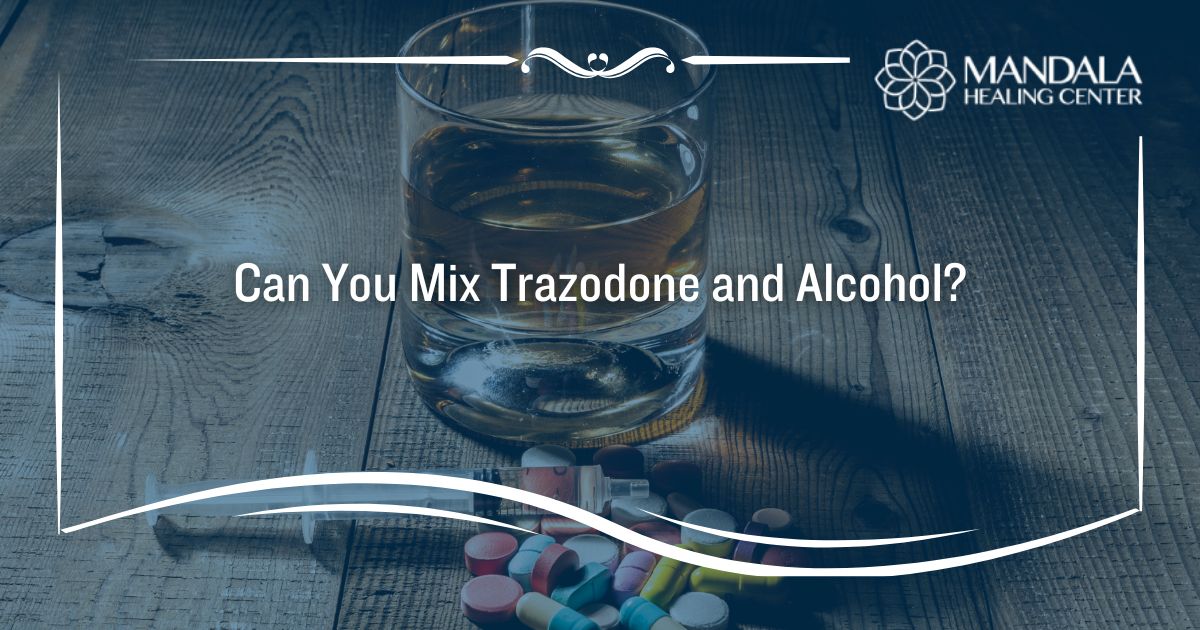Almost everyone has consumed alcohol at some point in their lives. Because alcohol use is so normalized, you might not think twice before drinking it while you are on a daily medication. Unfortunately, some prescription drugs should never be combined with alcohol.
Trazodone is a serotonin antagonist reuptake inhibitor (SARI).[1] Doctors prescribe it to treat conditions like major depressive disorder, anxiety, and insomnia. If you are taking trazodone every day, you might think it is okay to go out for drinks now and then.
However, mixing alcohol and trazodone can produce dangerous results. At first, you might only experience increased dizziness, drowsiness, and severe coordination issues. As you keep drinking, you could develop more serious effects like serotonin syndrome or an overdose.
If you cannot stay away from alcohol while taking trazodone, you could suffer from an alcohol use disorder. Alcoholism should always be treated in a professional alcohol rehab program. The Mandala Healing Center is here to help you overcome your damaging relationship with alcohol.
In this article, you will learn:
- What effects does trazodone cause?
- Can you mix alcohol and trazodone?
- What are the dangers of combining alcohol and trazodone?
What are the Effects of Trazodone?
Trazodone is considered a central nervous system depressant because of its sedating effects. While it is not addictive, it can lead to feelings like dizziness and drowsiness. That is why it is commonly prescribed to treat insomnia.
The side effects of trazodone may include:[2]
- Nausea and vomiting
- Diarrhea or constipation
- Changes in appetite and weight
- Weakness and fatigue
- Nervousness or anxiety
- Dizziness and drowsiness
- Nightmares or trouble sleeping
- Muscle aches and pains
- Dry mouth
- Changes in sex drive or ability
Thankfully, most side effects of trazodone will lessen once your body adjusts to the medication. If they continue for longer than a couple of weeks or become severe, consult with a healthcare professional immediately.
It is important to note that trazodone must be taken long-term for it to improve symptoms of anxiety, depression, or insomnia. Because of this, your body will become dependent on trazodone. In other words, you should never suddenly stop taking it, as you could experience adverse effects and withdrawal symptoms.
Should You Combine Alcohol and Trazodone?
Drinking alcohol while taking trazodone is not recommended. The Food and Drug Administration prints warnings on medication labels for drug interactions. According to the FDA, “Trazodone may enhance effects of alcohol, barbiturates, or other CNS depressants.”[3]
Combining trazodone and alcohol could lead to extreme drowsiness, dizziness, lowered blood pressure, and an increased risk of overdose due to central nervous system depression.
It is also important to note that alcohol tends to worsen mental health issues like depression. If you are taking trazodone to treat a mental illness, consuming alcohol could increase your symptoms, lessening the positive impact that the medication is having on your health.
Risks of Mixing Trazodone and Alcohol
While one alcoholic beverage might not have a severe interaction with trazodone, a night out drinking could cause potentially life-threatening effects. Speak with your doctor about your drinking habits before you begin taking trazodone. If you struggle with an alcohol use disorder, a rehab program can help you recover before beginning trazodone treatment.
The dangers of mixing alcohol and trazodone include:
Increased Side Effects
Both substances are considered central nervous system depressants. When combined, they enhance the effects of one another.
You could experience the following side effects when mixing alcohol and trazodone:
- Drowsiness and dizziness
- Fatigue and sedation
- Unconsciousness
- Coordination issues and trouble balancing
- Increased risk of falls and injuries
- Slowed heart rate and breathing
- Low blood pressure
Serotonin Syndrome
Both alcohol and trazodone increase the amount of serotonin available in your brain. This can cause you to have too much serotonin, leading to a condition known as serotonin syndrome. Unfortunately, serotonin syndrome can be life-threatening without prompt medical treatment.
The symptoms of serotonin syndrome include:[4]
- Agitation and restlessness
- Abnormal and rapid eye movements
- Fast heartbeat and high blood pressure
- Diarrhea
- Nausea and vomiting o
- Increased body temperature and excessive sweating
- Severe coordination and balance issues
- Overactive reflexes
- Hallucinations
- Seizures
Overdose
Because alcohol and serotonin are central nervous system depressants, combining them could lead to an overdose.
The symptoms of a trazodone and alcohol overdose may include:
- Extreme drowsiness and loss of consciousness
- Not responding to stimuli
- Rapid or irregular heartbeat
- Slowed or stopped breathing
- Vomiting and choking
- Seizures and coma
Find Help for Alcohol Abuse and Alcoholism
If you or a loved one suffers from alcohol and trazodone abuse, it’s time to seek professional help. The Mandala Healing Center is here to offer you the tools and support you need to achieve long-term recovery from alcohol and other substances.
Why Choose The Mandala Healing Center? Clients are taken on a journey of healing through complete immersion into evidence-based clinical modalities, multifaceted alternative therapies, and expert medical management, allowing them to fully detox and recover from drug and alcohol addictions. A program of care designed to encourage change creates a foundation that allows clients to find their higher purpose and reclaim their lives.
The Mandala Healing Center is a highly-rated drug and alcohol rehab program designed to help all walks of life recover. Contact us today for more information on how to get started.
References:
- The National Library of Medicine (NLM): Trazodone
- Medline Plus: Trazodone
- The Food and Drug Administration (FDA): Trazodone Label
- Merck Manuals: Serotonin Syndrome












